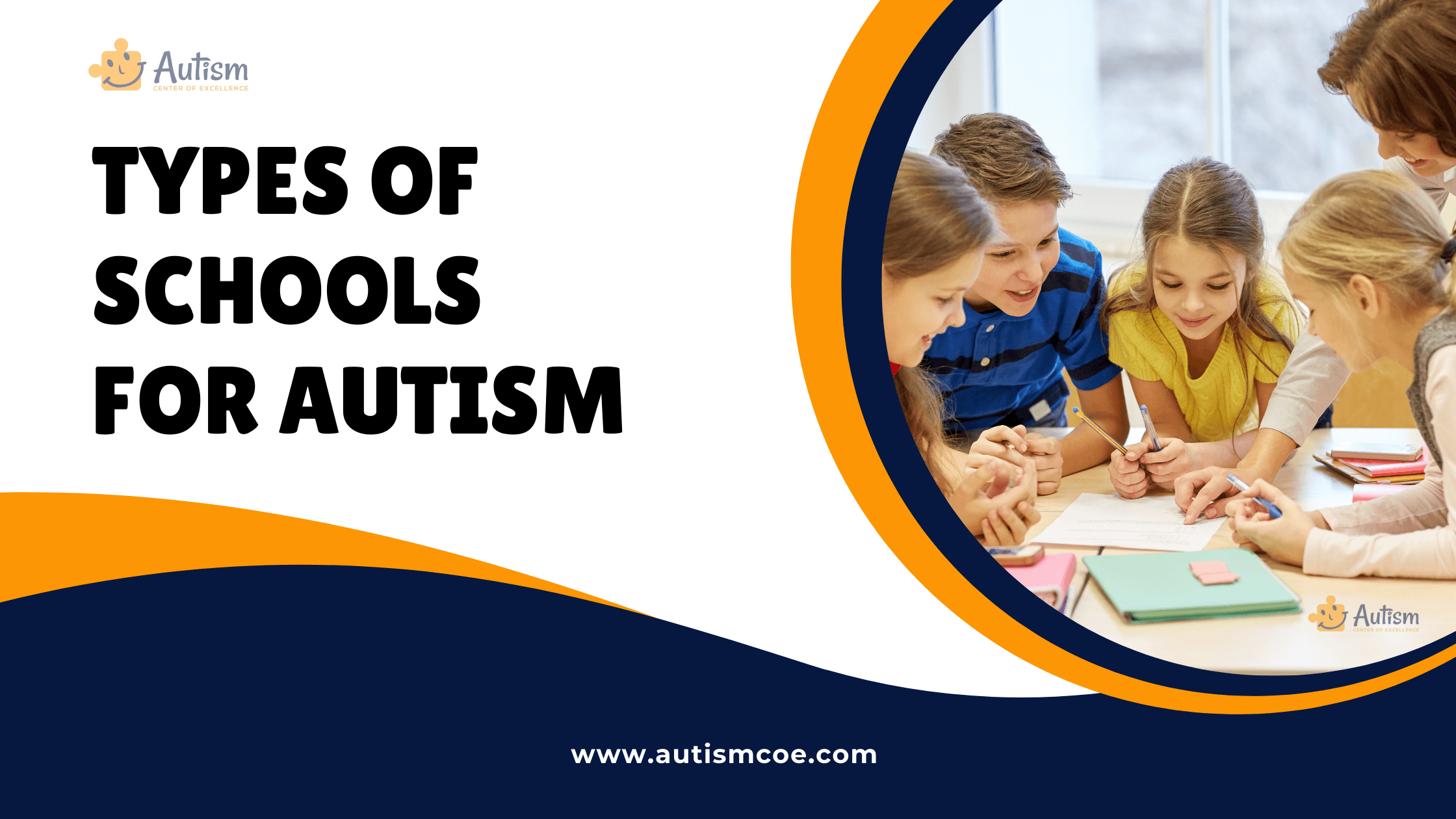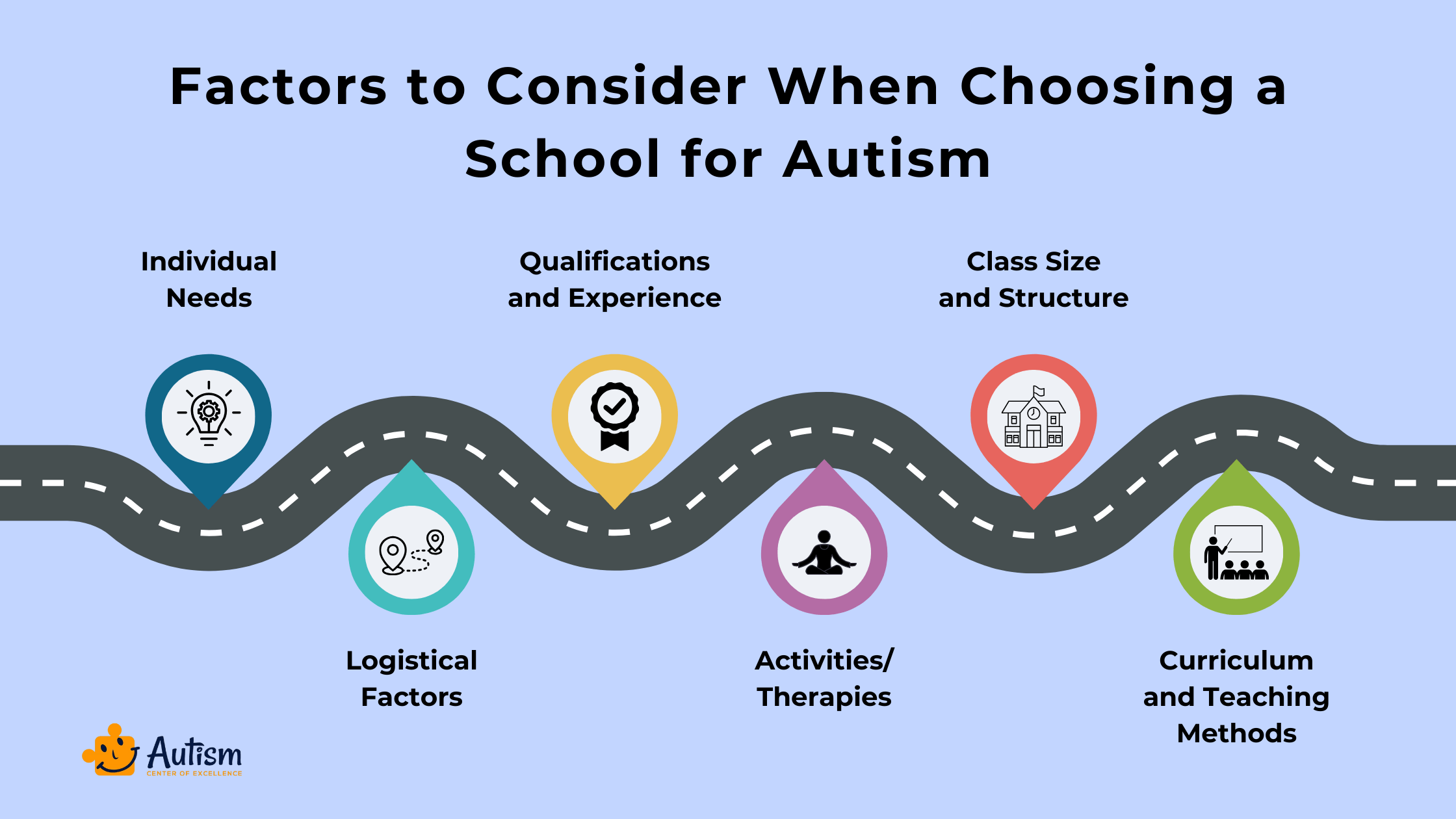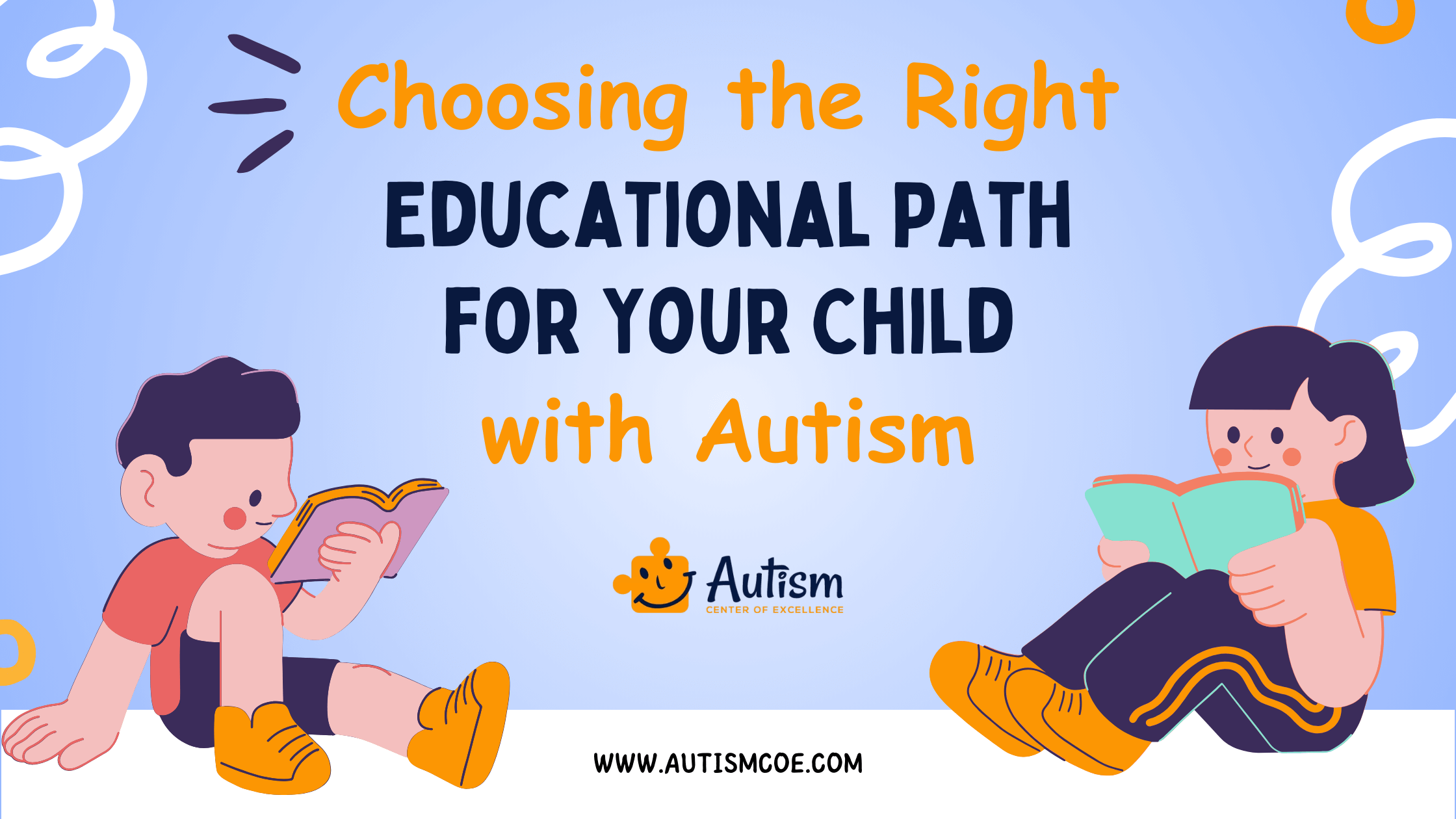Choosing the most suitable educational path for your child with autism is a crucial milestone that can be a breeding ground for your child’s personal development and long-term success. Education is the driving force that shapes a child´s future, and for children with autism finding the proper schooling customized to their individual parameters is of foremost necessity. In this article, we will discuss the importance of choosing the appropriate educational option for children with autism that helps them to reach their full potential and have a good life.
Education is not about teaching children only a set of facts and figures; rather, it’s about providing a suitable place where kids can evolve emotionally, socially, and academically. For kids dealing with autism, who may be very different from all other children and have their learning styles and difficulties, the appropriate educational setting to deal with these problems can make such a big difference in their lives. A supportive and inclusive educational setting can be the place where children with autism acquire significant skills, develop their communicative and social interactions, and get the confidence to face the challenges of their lives. Furthermore, a suitable educational program may be a basis of lifelong learning and success that will equip autistic children with the requisite skills for them to fulfill their potential. In the following paragraphs, we will highlight some of the points to consider in selecting the most suitable educational path for your child on the autism spectrum along with options that might offer improved outcomes for specific needs.
Understanding Autism Education
Autism education is designed specifically to meet the needs of kids with Autism Spectrum Disorder (ASD), focusing on problems starting from school and extending to social interaction and life skills. They may have diverse manifestations of symptoms and skills that could make a special education setting necessary or allow them to thrive in an inclusive environment with proper assistance. The aim is to support systems that guarantee successful interventions that address the unique needs of each child and promote their growth.
Specialized schools, specific programs for autism spectrum disorder, inclusive classrooms, and mainstream schools with support services are among the many kinds of educational programs for kids with autism that are available. Parents need to take into account things like their child’s capabilities and interests when picking the ideal learning environment. Doing so will guide them to make the right choices to take better care of their child’s education.

Types of Schools for Autism
When it comes to selecting the right educational setting for a child with Autism, parents have several options to consider. Each setting offers distinct features, benefits, and potential drawbacks, making it essential to explore them thoroughly before making a decision.
Public Schools:
- Public schools are commonly chosen by parents due to their accessibility and free or low-cost tuition.
- These schools typically offer inclusive classrooms, where children with autism learn alongside their neurotypical peers.
- While public schools provide a diverse learning environment, they may have limited resources and support services for children with special needs.
Private Schools:
- Private schools often offer smaller class sizes, specialized instruction, and a more individualized approach to education.
- These schools may have a specific focus on supporting children with Autism, providing tailored interventions and therapies.
- However, private schools can be expensive, and not all families may have the financial means to afford them.
Specialized Autism Schools:
- Specialized Autism schools are dedicated to serving children with autism spectrum disorder.
- These schools offer comprehensive support, evidence-based interventions, and a structured learning environment specifically designed for children with autism.
- While specialized autism schools provide targeted support, they may be limited in terms of diversity and inclusion.
Homeschooling:
- Homeschooling allows parents to customize their child’s education and pace according to their unique needs and preferences.
- It offers flexibility and individualized attention, which can be beneficial for children with autism who thrive in a familiar environment.
- However, homeschooling requires a significant time commitment from parents and may limit opportunities for socialization and peer interaction.
Inclusive Classrooms:
- Inclusive classrooms are mainstream educational settings that welcome children with diverse learning needs, including autism.
- These classrooms promote diversity, acceptance, and peer interaction, fostering a sense of belonging for children with autism.
- While inclusive classrooms encourage social integration, they may lack specialized support and accommodations for children with more significant needs.
Exploring these different types of educational settings allows parents to make an informed decision based on their child’s individual strengths, challenges, and support requirements. By considering the unique features, benefits, and potential drawbacks of each setting, parents can choose the educational path that best meets their child’s needs and sets them up for success.

Factors to Consider When Choosing a School for Autism
Choosing the right educational path for a child with autism is a significant decision that requires careful consideration of various factors. Here are some key considerations to keep in mind:
Individual Needs:
Every child with Autism is unique, with their own set of strengths, challenges, and learning styles. It’s essential to consider how well a particular educational setting can cater to your child’s individual needs and provide the necessary support to help them thrive.
Logistical Factors:
Consider practical aspects such as the location of the educational setting, transportation options, and accessibility. Choose a school or program that is conveniently located and easily accessible for both you and your child.
Qualifications and Experience:
Look into the qualifications and experience of teachers and staff members at the educational setting. Ensure that they have the necessary training and expertise in working with children with autism and implementing effective teaching strategies and interventions.
Activities/Therapies:
Evaluate the availability of support services, such as Speech Therapy, Occupational Therapy, and behavioral intervention, within the educational setting. These services play a crucial role in addressing your child’s specific needs and facilitating their overall development.
Class Size and Structure:
Consider the class size and structure of the educational setting. Some children with Autism may thrive in smaller, more structured classrooms with individualized attention, while others may do well in larger, more inclusive settings. Assess which environment would best suit your child’s learning style and preferences.
Curriculum and Teaching Methods:
Review the curriculum and teaching methods used in the educational program or school. Look for approaches that are evidence-based and tailored to the unique needs of children with autism. Consider whether the curriculum emphasizes important skills such as communication, social interaction, and independence.
By carefully considering these factors, you can make a more informed decision about the educational path that best meets your child’s needs and sets them up for success. Remember to involve your child in the decision-making process whenever possible and prioritize their comfort and happiness in the educational environment.
Join Our Weekly Newsletters!
Subscribe now to stay updated with our latest email updates.
Guiding Parents in Choosing Best Autism Education
Making the decision about your child’s educational path is a significant step that requires careful consideration and thoughtful planning. Here are some guiding principles to help you navigate this process and make an informed choice:
✅ Assess Your Child’s Needs:
Begin by assessing your child’s strengths, challenges, and specific areas of need. Consider their communication skills, social interactions, sensory sensitivities, and behavior patterns. Understanding your child’s individual profile will help you identify which therapies are most suitable for addressing their unique needs.
✅ Visit and Observe:
Schedule visits to the educational settings you are considering and observe the environment, interactions between students and staff, and overall atmosphere. Pay attention to factors such as class size, structure, and resources available. Visiting in person will give you a better sense of whether the setting is a good fit for your child.
✅ Ask Questions:
Don’t hesitate to ask questions during your visits and meetings with school administrators, teachers, and staff members. Inquire about their experience working with children with autism, the support services available, and how they accommodate individual needs. Asking questions will help you gather valuable information and insights.
✅ Seek Input:
Seek input from professionals, educators, and other parents who have experience with autism education. They can offer valuable perspectives and advice based on their knowledge and experiences. Consider joining support groups or online forums where you can connect with other parents and share insights.
✅ Consider Your Child’s Needs:
Keep your child’s individual needs, strengths, challenges, and preferences at the forefront of your decision-making process. Consider factors such as their learning style, communication abilities, sensory sensitivities, and social skills. Choose an educational setting that aligns with your child’s unique characteristics and supports their overall development.
✅ Advocate for Your Child:
Advocate for your child’s needs and preferences throughout the decision-making process. Your role as a parent is crucial in ensuring that your child receives the support and accommodations they require to succeed in their educational journey. Don’t be afraid to speak up and advocate for the services and resources that will best meet your child’s needs.
By following these steps and taking an active role in the decision-making process, you can choose the right educational path for your child with autism. Remember that every child is unique, and what works for one child may not work for another. Trust your instincts, gather information, and make the decision that feels right for your child and your family.
Frequently Asked Questions & Answer
What Factors Should I Consider When Choosing an Educational Path for My Child With Autism?
Consider your child’s individual needs, strengths, and challenges, as well as their learning style and preferences. Additionally, take into account logistical factors such as location, transportation, and accessibility of the educational setting.
Are There Different Types of Educational Settings Available for Children With Autism?
Yes, there are various options including public schools, private schools, specialized autism schools, homeschooling, and inclusive classrooms. Each option has unique features and benefits to consider.
How Can I Determine Which Educational Setting is Best for My Child?
Research and visit different educational settings, ask questions, and seek input from professionals, educators, and other parents. Consider your child’s individual needs and preferences when making this decision.
What Should I Do if I'm Unsure About Which Educational Path is Best for My Child?
Seek guidance from professionals, educators, and other parents who have experience navigating the educational system for children with autism. Trust your instincts and take the time to explore different options before making a decision.
Conclusion
In conclusion, choosing the right educational path for your child with autism is a crucial decision that requires careful consideration and planning. Throughout this article, we’ve explored various factors to consider when making this decision, including the child’s individual needs, strengths, challenges, learning style, preferences, logistical factors, and the qualifications of teachers and staff.
It’s essential to recognize that there is no one-size-fits-all approach to autism education, and what works best for one child may not work for another. Therefore, it’s vital to take the time to research and explore different educational settings, visit schools, ask questions, and seek input from professionals, educators, and other parents.
Remember, you’re not alone in this journey. The Autism Center of Excellence stands ready to assist you in navigating this complex journey. Our team offers personalized guidance and resources tailored to your child’s specific requirements. Ultimately, parents should trust their instincts and advocate for their child’s needs and preferences throughout the decision-making process. By doing so, they can ensure that their child receives the support and resources necessary to thrive academically, socially, and emotionally. The Autism Center of Excellence provides ABA Therapy, ABA for Early Intervention, ABA for School Readiness, Speech Therapy, and Occupational Therapy services for children aged 2 – 14 years in-home as well as in center-based environments.
Please Note: The content of this blog is for informational purposes only and should not be considered a substitute for professional medical advice, diagnosis, or treatment. Consult a qualified health care professional for personalized guidance tailored to your specific situation.

Bhavika Bhasin
Bhavika Bhasin is the Research and Marketing officer at AutismCOE. She works with children and adults with ASD. Her clinical research includes evaluating various available autism screening and diagnosis methods and their efficacy. She is currently developing a novel screening exam that is indicated to be more accurate than the existing available exams. She is also writes articles papers for various publications.


